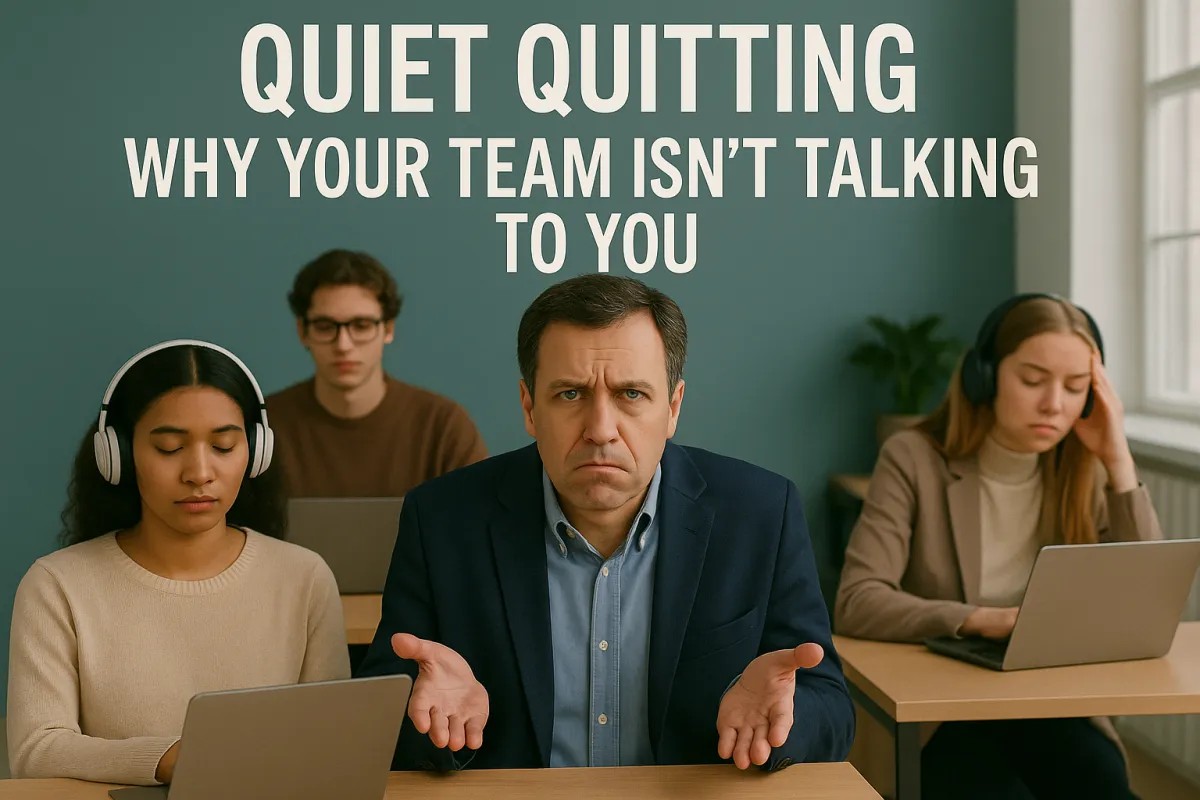
Quiet Quitting Kills Morale
Why Your Team Isn’t Talking to You
(And How to Fix It)
The silence before the resignation letter.
🧊 Let’s start with the hard truth:
If your team isn’t giving you feedback, asking questions, or raising concerns…
It doesn’t mean everything’s fine.
It means they don’t feel safe enough to speak.
And silence? Is the beginning of disengagement.
What Silence Really Means
You’re not “winning” just because no one’s complaining.
When your team goes quiet, it usually means:
They’ve tried to speak up—and it didn’t go well
They assume nothing will change, so why bother
They’re afraid of backlash, blame, or judgment
They’ve emotionally checked out (and may physically follow)
Silence isn’t peace. It’s survival.
The 5 Reasons Your Team Isn’t Talking to You
🧱 1. You unintentionally punish honesty
When someone gives feedback and you react with defensiveness, withdrawal, or subtle punishment—they remember.
🧑💻 2. You don’t ask the right questions
“How’s everything going?” isn’t an invitation—it’s a default. Ask better questions, get better trust.
🔁 3. You always turn it back to you
If someone shares something vulnerable and you hijack it with your perspective or problem—you just taught them not to open up again.
⌚ 4. You’re too busy to be present
Even if your door’s open, your energy might not be. Teams feel when you’re not really listening.
❄️ 5. You’ve built a culture of silence without realizing it
If you don’t model vulnerability, give transparent updates, or admit when you’re wrong—your team won’t either.
💩 You use “team talk” to avoid hard truths
You say things like:
“We’re a team.”
“Let’s stay positive.”
“We all have to work together.”
“We’re doing our best.”
On the surface, these sound like encouragement. But when they’re used in response to honest feedback, discomfort, or frustration, they send a different message:
“I’m not actually listening. I just want this conversation to go away.”
Why it hurts:
Blanket statements may feel like unity to you—but to your team, they feel like erasure. You're skipping the discomfort to get to the harmony. And that makes people shut down.
Courageous conversations can’t be solved with slogans.
What to do instead:
Say,
“Thank you for saying that. I want to sit with this and talk more. Your frustration is valid.”
Validation first. Solution later. That’s what earns trust.
🛠️ How to Fix It: 5 Repair Tools for Rebuilding Trust
🧠 1. Name the silence
“I’ve noticed we haven’t had many open convos lately—I want to change that.”
Call it gently. Disarm the fear. Reopen the door.
💬 2. Ask “safe” but real questions
“What’s one thing I do that makes your job easier?”
“What’s something I do that could be getting in the way?”
“What’s something I should know, but don’t?”
“What would you change about our communication if you could?”
✍️ 3. Make feedback anonymous—at first
Use surveys or written prompts to give your team a chance to ease in before speaking up face-to-face.
👂 4. Say “Thank you” first. Always.
Even if the feedback stings. Even if you disagree.
“Thank you for telling me. I want to think about this and come back with intention.”
🔄 5. Follow up. Show them you listened.
Change doesn’t have to be huge—it just has to be real.
“You mentioned [X], and I’ve been thinking about it. I want to try [Y]. Let’s see how it feels.”
That one moment could unlock years of trust.
💊 Here’s the truth:
People don’t leave because they feel unheard.
They leave because they stopped trying to be heard.
You don’t have to be perfect.
You just have to be present.
✨ Want help building a culture where people want to speak up?
Turnover Rx™ is our 6-week coaching experience for business owners and managers who want to lead with clarity, trust, and retention power.
Let’s rebuild the bridge before your team checks out for good.
[ Learn More About Coaching → ]
